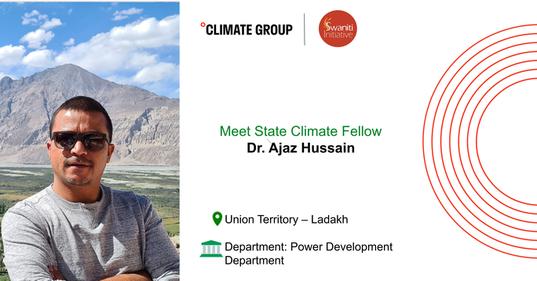The State Climate Fellows initiative in India supports subnational climate action. In this interview, Dr. Ajaz Hussain speaks about climate action in the fragile ecosystem of Ladakh.
Tell us about your work as a State Climate Fellow in Ladakh. What are the most exciting aspects of your work?
Working as a State Climate Fellow here has been an incredibly rewarding and dynamic experience. My role revolves around projects related to renewable energy of the Power Development Department. I help the department with the analysis of available data, mapping of sites selected for installation of rooftop solar, solar irrigation, solar water heater, and solar power plants. I also write reports.
One of the most exciting aspects of my work is collaborating with the Ladakh Renewable Energy Development Agency (LREDA) in Kargil and Leh districts. Engaging with this department has allowed me to gain invaluable insights into the region's renewable energy strategies at the village level.
What unique opportunities does Ladakh present in terms of climate action work? What are your biggest challenges?
Working on climate action in Ladakh is both exciting and challenging due to the region's distinct characteristics. These are:
- Ladakh's extreme climate conditions, including high altitude and temperature variations offer a living laboratory to study and implement innovative climate adaptation strategies. Solutions developed here can serve as examples for other vulnerable regions.
- The region's abundant sunlight and wind resources make it a prime candidate for large scale adoption of renewable energy technologies. Leveraging these resources can not only reduce carbon emissions but also enhance energy security.
- Ladakh is home to numerous glaciers, making it crucial for glacial monitoring and research. Studying glacier melt rates can contribute to a deeper understanding of climate change impacts and inform adaptation plans.
- Integrating traditional knowledge with modern climate science can lead to holistic and effective adaptation strategies that resonate with the local context.
The challenges are:
- Balancing development with environmental conservation given the increasing demands on resources.
- The region's terrain and remote location are challenging for the implementation of climate adaptation projects.
- The introduction of new practices and technologies requires careful consideration and respect for local cultural values.
- Climate change awareness among the local population and policymakers.
- Securing funding and resources for climate projects in remote areas.
As a young professional, how has your experience been working on climate action at the subnational level with the government?
The experience has been a mix of challenges, learning opportunities and moments of inspiration. For instance:
- Working within the government structure often means dealing with bureaucratic processes and protocols. Adapting to these intricacies while striving to maintain efficiency can be a steep learning curve.
- Working with the government allows for the practical application of academic knowledge. Theoretical concepts about climate change, policy development, and project management come to life in real-world scenarios.
- Engaging with diverse stakeholders, including local communities, NGOs, and private sector entities, has provided valuable insights into their perspectives, needs, and aspirations.
- Translating ambitious climate policies into actionable, on-the-ground projects demands careful planning and stakeholder engagement.
How do you think your fellowship is contributing towards Ladakh’s subnational climate action goals?
I am actively involved in gathering, analysing, and interpreting data on renewable energy specific to Ladakh. This data inform decision-making, make the local administration’s contribution to fighting climate change stronger, and help prioritise adaptation strategies. I work to create long-term climate action plans and strategies for Ladakh. These plans will provide a roadmap for building climate resilience over time, ensuring that the region is prepared to face evolving challenges. My role also involves assessing Ladakh's renewable energy projects.
In addition, through collaborations with government bodies, NGOs and local communities, I am fostering a network of stakeholders dedicated to climate resilience. This engagement will spur more inclusive and comprehensive climate action plans.
I work to create long-term climate action plans and strategies for Ladakh. These plans will provide a roadmap for building climate resilience over time, ensuring that the region is prepared to face evolving challenges.
- Dr. Ajaz Hussain
I work to create long-term climate action plans and strategies for Ladakh. These plans will provide a roadmap for building climate resilience over time, ensuring that the region is prepared to face evolving challenges.
- Dr. Ajaz Hussain
